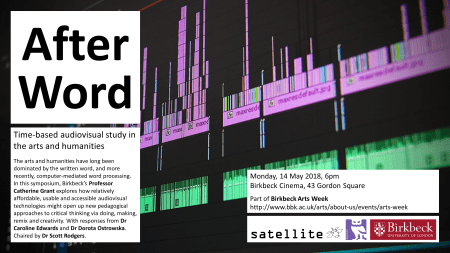
Thankfully – at least in the circles that I inhabit and traverse – it seems that it’s again okay to think and talk about medium specificity. In the not too recent past, thinking a bit too much, or talking a bit too loudly, about that sort of thing would earn you the label of ‘technological determinist’. But as John Durham Peters put it rather well in his book The Marvelous Clouds:
The fear of ‘technological determinism’ serves to uphold a barrier between mind and matter, human and thing, animal and machine, art and nature – precisely the continuities across which the most interesting cultural histories of media are written. By isolating acute parts of the world as technology that we should control, it effaces the existential fact that we live environmentally, dependently, in apparatuses not of our own making, starting with the womb itself.
Yet even if it is now okay to ask questions about things like form, matter, technology, infrastructure, medium (etc) across the arts, humanities and social sciences, it appears that we don’t seem to ask those questions as much when it comes to our teaching and pedagogy. For the most part, when we ask our students to express themselves critically, in a theoretically-informed way, we expect that to happen through the written word. More prosaically, we ask our students to go and write something with software programme like Microsoft Word.
There’s nothing particularly wrong with that! I am a committed defender of the essay. Yet on the same score, I’m quite interested in the possibility that our pedagogical mediums might expand. Not just for the sake of it, to tick some box with a ‘technology-enhanced learning’ label next to it, but rather to provide new ways for students to think critically and deal with theory.
So I’m quite excited about an event that I am organising next week (14 May 2018) which addresses these themes precisely, with my colleague Professor Catherine Grant, titled ‘After Word: Time-based audiovisual study in the arts and humanities’. The event, which is part of Birkbeck Arts Week, and sponsored by Satellite (the School of Arts working group focused on digital technologies and pedagogy), includes responses from Dr Caroline Edwards and Dr Dorota Ostrowska, and will be followed by the wine reception.
The full abstract is below – if you can make it (I hope you can) please register here.
After Word: Time-based audiovisual study in the arts and humanities
14 May 2018, 6pm, Birkbeck Cinema, 43 Gordon Square, London WC1H 0PD
The binary of theory and practice still casts a long shadow over the arts and humanities. For some time, the preferred mode of critical, theoretically-informed expression in these fields has been the written word. Words mediated, more prosaically, via software programmes such as Microsoft Word. When alternative modes of expression and analysis – and their related hardware and software apparatuses – come into play, the register tends to shift to a pedagogy regarded as more ‘practical’ or ‘vocational’.
While this binary has never been absolute, and is often exaggerated, its days are arguably numbered. The technical means of media creation and distribution (e.g. recording equipment, editing software, online networks and platforms) – previously the preserve of professional media producers and highly vocational study – have become cheaper, easier to use, and, in principle, more available to a wider range of potential users. And, as a result, a space has opened for an arts and humanities that unites rather than separates theory and practice: where critical thinking and theory might be explored through new forms of doing, making, remix and creativity.
In this symposium, Professor Catherine Grant will present on these topics with reference, primarily, to her own experimentation with making, teaching and publishing video essays over the last decade. She will demonstrate how the sensuous and time-based methodologies of audio-visual forms of research and expression can frame particularly instructive and persuasive kinds of phenomenological possibility for media and humanities studies. As well as an introducing a hands-on understanding of audiovisual argumentation (involving selection of evidence, montage and mise en scene, titling, sound editing and other creative effects), audiovisual essays also offer an active viewing process ideal for sharing in classroom situations as well as online. Unlike written texts, video essays don’t have to remove themselves from audio-visual, audio or visual-specific forms of meaning production to have their knowledge effects on us, and so may add a whole suite of key skills to the central ones of ekphrasis-based forms of writing. Professor Grant will show some of her most recent video-essay work to illustrate her talk.
Professor Grant’s talk will be followed by critical responses from Dr Caroline Edwards and Dr Dorota Ostrowska, and will be chaired by Dr Scott Rodgers. The event will be followed by a wine reception.
Register here: https://www.eventbrite.co.uk/e/after-word-audiovisual-study-in-the-arts-and-humanities-tickets-44180979499
0 Comments Leave a comment